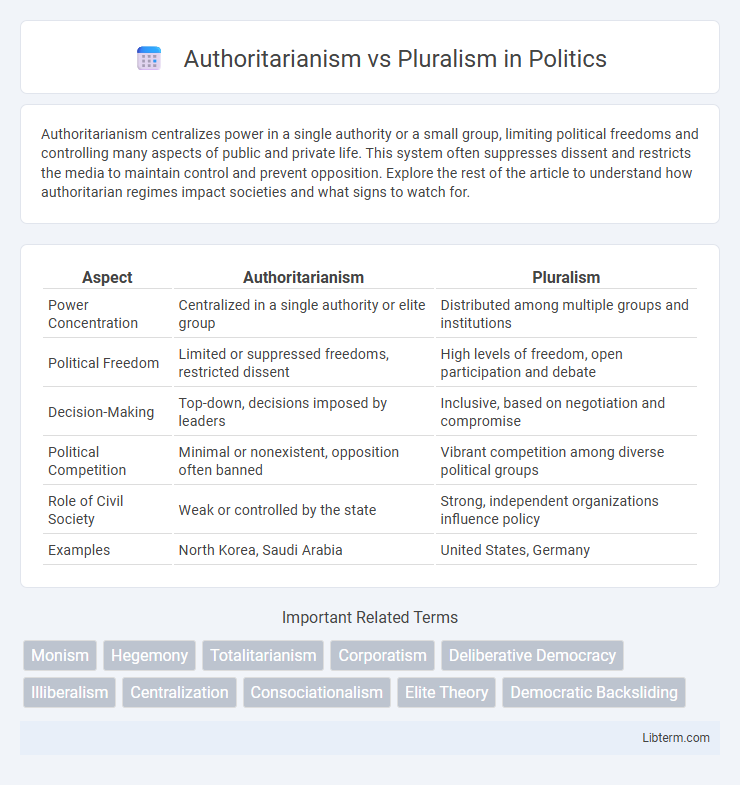Authoritarianism centralizes power in a single authority or a small group, limiting political freedoms and controlling many aspects of public and private life. This system often suppresses dissent and restricts the media to maintain control and prevent opposition. Explore the rest of the article to understand how authoritarian regimes impact societies and what signs to watch for.
Table of Comparison
| Aspect | Authoritarianism | Pluralism |
|---|---|---|
| Power Concentration | Centralized in a single authority or elite group | Distributed among multiple groups and institutions |
| Political Freedom | Limited or suppressed freedoms, restricted dissent | High levels of freedom, open participation and debate |
| Decision-Making | Top-down, decisions imposed by leaders | Inclusive, based on negotiation and compromise |
| Political Competition | Minimal or nonexistent, opposition often banned | Vibrant competition among diverse political groups |
| Role of Civil Society | Weak or controlled by the state | Strong, independent organizations influence policy |
| Examples | North Korea, Saudi Arabia | United States, Germany |
Defining Authoritarianism and Pluralism
Authoritarianism is a political system characterized by concentrated power in a single authority or a small group, limiting political freedoms and often suppressing dissent to maintain control. Pluralism, in contrast, emphasizes the distribution of power across diverse interest groups and institutions, fostering political participation and competition. These concepts represent opposing frameworks for understanding governance, power distribution, and citizen engagement in political processes.
Historical Origins and Evolution
Authoritarianism traces its historical origins to ancient and medieval regimes characterized by centralized power and limited political pluralism, often legitimized by divine right or military control. Pluralism evolved notably during the Enlightenment, emphasizing multiple centers of power, inclusive governance, and the safeguarding of individual rights against authoritarian rule. Over time, the evolution of pluralism has been marked by the institutionalization of democratic norms and civil society, contrasting sharply with the persistence of authoritarian regimes that prioritize state control and restrict political dissent.
Key Characteristics of Authoritarian Regimes
Authoritarian regimes are characterized by centralized power maintained through limited political pluralism, restricted civil liberties, and the absence of competitive elections. These regimes often rely on coercive institutions such as the military, police, and secret services to suppress dissent and control society. Key features include the concentration of authority in a single leader or ruling party, restricted media freedom, and limited political participation among citizens.
Core Principles of Pluralistic Societies
Pluralistic societies emphasize the coexistence of diverse groups, ensuring multiple centers of power and open political competition. Core principles include inclusive participation, protection of minority rights, and institutional mechanisms that encourage negotiation among varied interest groups. This framework promotes decentralization of authority and fosters a balance that limits authoritarian control.
Political Institutions: Centralization vs. Decentralization
Authoritarianism centralizes political institutions, concentrating power within a single ruling entity or small elite, limiting political pluralism and public participation. Pluralism, in contrast, promotes decentralized political institutions, dispersing authority across multiple levels of government and enabling diverse groups to influence decision-making processes. Decentralization fosters accountability, transparency, and responsiveness by allowing local governments and civil society to hold central authorities in check.
Citizen Participation and Civil Liberties
Authoritarianism limits citizen participation by centralizing power and restricting political engagement while curtailing civil liberties such as freedom of speech, assembly, and press. Pluralism encourages diverse interest groups and broad citizen involvement in the political process, protecting civil liberties and promoting competitive governance. In pluralistic systems, active participation and the safeguarding of rights foster accountability and political responsiveness.
Media Freedom and Information Control
Authoritarianism centralizes control over media, imposing strict censorship and limiting access to diverse information sources, thereby suppressing dissent and shaping public opinion to maintain power. In contrast, pluralism supports media freedom by encouraging a multiplicity of independent outlets that promote diverse viewpoints and facilitate an informed citizenry. The degree of information control directly influences democratic governance, with authoritarian regimes restricting transparency while pluralistic societies uphold open communication and accountability.
Economic Outcomes under Authoritarianism and Pluralism
Authoritarianism often results in centralized economic decision-making, which can lead to rapid industrialization but may also cause inefficiencies and corruption due to lack of transparency and accountability. Pluralism supports diverse economic interests and competitive markets, promoting innovation and sustainable growth through inclusive policies and institutional checks. Economic outcomes under pluralism generally show higher resilience and adaptability compared to the volatility and inequality often observed in authoritarian regimes.
Case Studies: Real-World Examples
The comparison between authoritarianism and pluralism is vividly illustrated in case studies such as China and the United States. China's authoritarian regime exercises centralized control, limiting political freedoms and suppressing dissent, while the United States embodies pluralism with its multiple power centers, competitive elections, and robust civil society. These real-world examples highlight how authoritarian systems maintain stability through control, whereas pluralist systems thrive on diversity and political participation.
The Future of Governance: Trends and Challenges
Authoritarianism faces increasing challenges from pluralistic demands for inclusive representation, transparent decision-making, and protection of civil liberties in the evolving landscape of governance. Emerging trends highlight the rise of digital activism, decentralized networks, and global interdependence, which amplify pluralistic pressures against centralized authoritarian control. Future governance will need to balance security with democratic participation, addressing socio-political complexities while integrating technological advancements to ensure legitimacy and stability.
Authoritarianism Infographic

 libterm.com
libterm.com